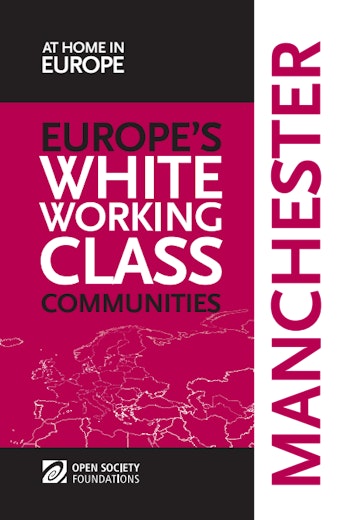Community Spirit Prevails Despite Anxieties and Alienation in English White Working Class Neighborhoods
MANCHESTER—A strong sense of pride and community endures amongst the English white working class though the lack of skilled job opportunities, housing pressures and negative media portrayals are having a demoralizing effect, new research finds.
Europe’s White Working Class Communities, launched by the Open Society Foundations, examines the daily experiences of six communities in Western Europe, including Manchester, and their views on a range of issues including employment, health, education, housing, politics, and media.
“The Manchester study focuses on one particular community in the north of the city but parallels can be drawn with experiences around the country. We set out to move beyond the current rhetoric and stereotypes and listen to the communities themselves,” says Nazia Hussain, director of Open Society Foundations’ At Home in Europe project. “In Higher Blackely we found a resilient and close knit community with a strong work ethic and close family ties.”
The research found that working class communities feel they are bearing the brunt of rapid changes in society and many have lost faith in their ability to have any real influence on decision-making processes. This powerlessness is made worse by negative media portrayals; participants in this research felt strongly that the means of representing white working class communities are almost exclusively in the hands of people who are not drawn from those communities.
Other main findings of the Manchester report include:
- People remain open to interaction with new communities, despite anxieties about immigration and cultural change, but feel support is needed to ensure their own local history, social bonds and shared spaces are not weakened
- Perceptions of unfair housing allocation can be a major source of tension; continued engagement between authorities and communities is needed to prevent this undermining community stability
- There is a deep-rooted frustration about formal politics and powerful institutions and a growing sense of apathy and disillusionment
- Public service providers in the area are highly motivated and committed to supporting the community; consultation and participation is promoted by local authorities but a perception of being “left out” persists for some
- Mental health is a real concern for some, particularly due to unemployment, substandard housing, and food poverty
“Communities need an open, nonjudgmental space to share their concerns on everything from housing, to education and immigration—right now, the debate ignores the realities of people’s lives and is dominated by single issues that have more to do with expressions of people’s anxiety rather than the cause” commented Amina Lone, a co-author of the Manchester report. “This research reveals a complex set of influences impacting people’s lives in Higher Blackley; society cannot afford to leave communities like this behind.”
As well as city specific analysis, the research also compares experiences of white working class communities in Aarhus, Amsterdam, Berlin, Lyon, Manchester, and Stockholm. Strikingly, across Europe, participants display strong local identities and positive views of life in their communities, despite high unemployment, low income, and numerous other challenges.
###
The Open Society Foundations work to build vibrant and tolerant societies whose governments are accountable to their citizens. Working with local communities in more than 100 countries, the Open Society Foundations support justice and human rights, freedom of expression, and access to public health and education.
